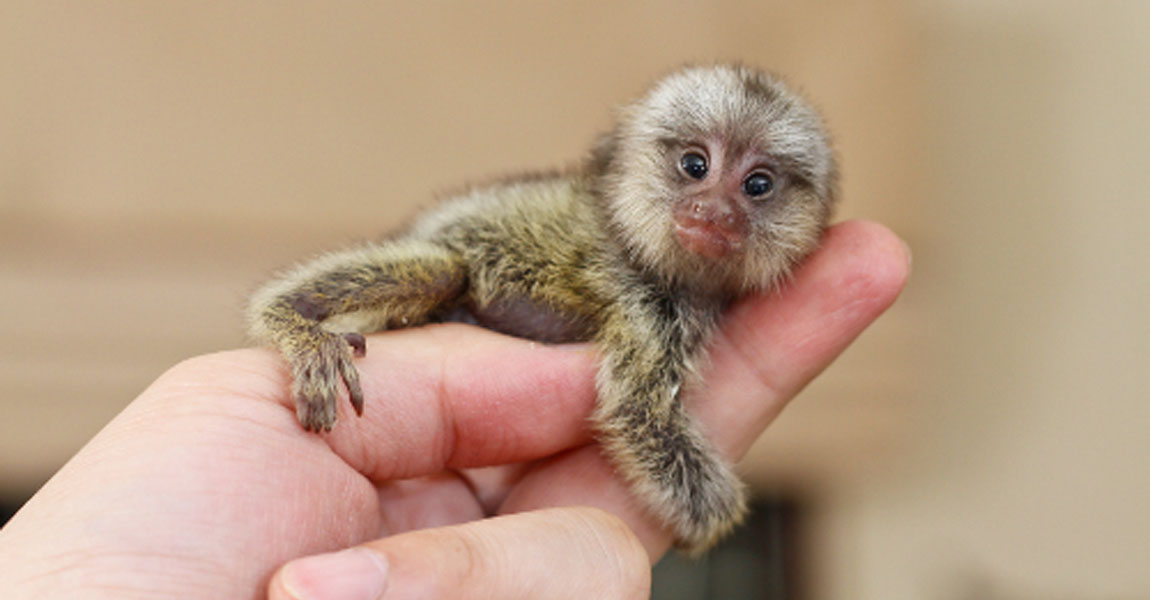Caring for your new Marmoset baby in its first few weeks.
WEEK 1
CAREKeep an accurate measurement and weight for your baby every week
Always keep your baby warm. Temperatures between 23-27 degrees C are ideal.
Stimulate your baby after each feed to help them with their bodily functions
Progress
Your baby should sleep almost constantly between feedings
If they are crawling around, they are either, not happy, not warm enough/too warm, hungry or they have wind and require stimulation to release wind, or to go to the bathroom
NEEDS
Keeping contact with you, clinging and suckling is their greatest need
Carry your baby around with you as much as possible
Remember that babies are extremely fragile, especially in their first week
Never fall asleep with your baby, as crushing them is a distinct possibility
Keep them out of wind drafts, and cold conditions. Always have a blanket with you
Germs are a number one health hazard at this age. Never allow your baby into contact with anyone other than yourself/the people that are caring for them
WEEK 2
FEEDINGMilk intake should rise to about 8-12 ml, per day, from the age of 10 days
Don't worry if your baby sometimes wants more than 1ml of milk every 2 to 2.5 hours
Babies will generally never overeat, and will turn their heads away when they are full and refuse more..
Remember to stimulate after every meal.
CARE
Weight and Length should continually increase on a weekly basis
Still always remember to keep your baby warm at all times
Stimulating is still important, even though your baby may have started to urinate and defecate alone
PROGRESS
Babies should still be spending most of their time sleeping
Awake times will increase and they will start to want to explore
Your baby should be able to now crawl unsupported
NEEDS
Carry your baby around with you as much as possible
If possible, start allowing contact with other monkeys
Be warned: Not all adults will accept a new baby
Your baby should, by now, recognise your voice and climb into your hand at feeding times
PROBLEMS YOU MAY ENCOUNTER
A curly tail is a good indicator of health in your baby
Your baby will want to cling tightly to you and will resist letting go
Stools should have the consistency of putty
WEEK 3
FEEDINGBy 20 days old the daily intake of milk should increase to about 20ml a day
Start adding a pinch of baby porridge to each meal
Make sure that your baby gets some sunlight every day
Meal quantities will have increased, and feeding times will have stretched out a bit
CARE
By this time, your baby's tummy should be working on it's own, but you can continue with the stimulation if it seems necessary
PROGRESS
Periods of being awake will now increase, as will levels of curiosity
Grabbing things from you, and showing interest in their surroundings will become more obbvious
NEVER allow your baby to take any food from your mouth, or from anything that your mouth, or saliva, have come into contact with. The Herpes Virus, which is present in human saliva, is Deadly to your baby monkey. Do Not aloow your baby close to your mouth.
NEEDS
Never leave your baby alone. They will cry out and become very stressed if left alone
Let your baby cling to your hair and ride around with you.
If your baby wakes and you are not around, they Will call for you
Your baby will start to show a more playful spirit and may start to suck their thumbs.
WEEK 4
FEEDINGFeedings should now be spaced out between 3-5 hours apart
Add a scoop of baby porridge to each milk feeding
Start to encourage your baby to lick a bit of Purity, or baby food
CARE
Your baby should have as much contact as possible with other monkeys at this point to help him to learn the natural mannerisms of a monkey
Never leave your baby alone as this is scary for them
Keep your baby warm at all times
PROGRESS
Your baby should now be much more lively and be crawling all over you
Clinging to your hair will still be one of their favourite spots
Your baby will be much more playful by this stage and will show a lot of interest in anything that you are doing
NEEDS
Still needs Constant Company. Do not leave your baby alone.
WEEKS 5 & 6
FEEDINGYour baby should now start feeding themselves from a small bowl of baby milk and porridge
Make sure that you leave a small treat of Purity for your baby to snack on
While they are learning to feed themselves, they may be a bit messy, but as they learn, they will begin eating on their own with minimal fuss
PROGRESS
Your baby will now need a lot of your attention and will be very demanding
They will still prefer to play all over you than to explore further, and may still spend most of their time clinging to your head
They will still take a lot of naps and spend a lot of time sleeping
Start introducing baby toys and small pet toys to your baby to satisfy their curiosity
NEEDS
Your baby will still show distress when left alone. Your presence is essential
You are acting as their parent, and so they rely on you for their protection
At this stage in life, in the wild, they have constant attention from family and troupe members, so being alone is completely unnatural





